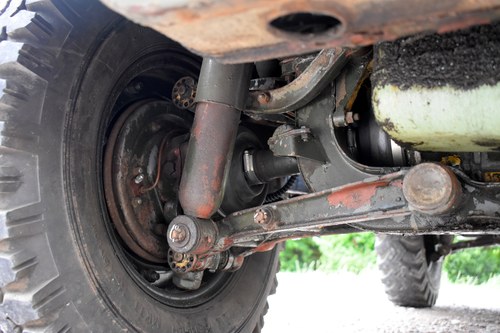Highlights
• A different kind of open-air motoring – fun without going fast
• Rugged and dependable off-road capabilities
• Wonderful patina
• Interesting alternative to Jeeps and Land-Rovers
The Background
After the success of America’s Jeep in the Second World War, the British Army was eager to have a multi-purpose light truck of its own. In spite of competition from the Nuffield Organisation, Austin was awarded the contract to build 15,000 vehicles from a former aircraft factory at Cofton Hackett, on the outskirts of the Longbridge works, which was specially adapted for the purpose.
Built from 1951 to 1957, Champs were quite unlike anything Austin had attempted previously. A four-wheel-drive quarter-ton truck, it utilised the straight-four, 2838cc Rolls-Royce B40 engine. The Rolls-Royce B-series engines were developed specially for use in British Army vehicles and, in their various guises, also powered the Daimler Ferret, Humber Pig and six-wheeled Alvises.
Although a civilian version of the Champ was offered, the vast majority were built for military use. Champ was actually the civilian name; officially the military version was the less catchy ‘Truck, ¼ Ton, 4x4, CT, Austin Mk. I’. Of the military vehicles, almost all were used as either basic cargo trucks or wireless vehicles.
In service, the Champ demonstrated outstanding capabilities but its downfall was its cost and complex engineering. After only 4000 had been built, the contract with the Army was terminated and the cheaper and simpler Land-Rover started to fill its place. The last military Champs were sold off to the public in 1968. The knock-down prices at which they were offered helped them to win a new fan following from civilians who found them extraordinarily fun and well suited to leisure activities.
The History
The British Motor Industry Heritage Trust certificate shows that this Champ, chassis WN1/3979, was supplied new to the War Department in 1953 in standard Bronze Green paint. It carried the military registration mark 39 BE 79.
It was demobilised and registered for civilian use as OPE 201E on 6th April 1967. Its new owner was a Peter Hatfield of Sunbury-on-Thames, Middlesex. There is no indication of how the Champ spent its subsequent life except that it travelled to France at some point and was imported back by its previous owner. It was reregistered in October, 2020, which is why it now carries a non-transferable age-related number. There is nothing to suggest it ever actually received a French registration, so it may have spent its time abroad as a farm runabout. Considering its outstandingly low mileage, this seems likely.
The vendor, a member of the Austin Champ Owners’ Club and the Historic Military Vehicle Association, bought the Champ with fond memories of the three he had owned and enjoyed in the 1970s. With a view to keeping the car for the long term, he undertook some light work on it earlier in the year but, sadly, illness now forces the sale.
Paperwork
As well as a V5, the paperwork file consists mainly of a few invoices for new parts bought in the spring of this year. As stated, there is little in the way of history save for a photocopy of the original logbook and import documents, although a British Motor Industry Heritage Trust certificate has been issued and adds some further depth.
A very useful addition is a facsimile copy of the army’s technical handbook for unit, field and base repairs, supplied by www.vintagemvmanuals.co.uk. This dense volume should prove a great assistance if any problems should arise, as it was written to be understood by all soldiers, who could not be assumed to be mechanically-minded.
The Interior
Although the Champ doesn’t have much of an interior to speak of, what it does have is very nice. The vendor believes the upholstery is original, in which case it has survived in very good condition. In keeping with the rest of the car, the upholstery and interior paint sport an attractive patina.
As far as the instruments go, the fuel gauge and temperature gauge are not presently working, although the vendor advises that there is very little likelihood that the Champ will overheat. The horn and vacuum-operated wipers both work as they should, and the seats are surprisingly comfortable given their basic construction.
The Exterior
As the pictures show, this Champ is no pampered show queen. It has acquired some battle scars over its life, just as a vehicle designed for field combat ought to. A small dent on the bonnet and a scuffed bumper very much enhance its visual appeal. Where the engine has been repainted, there is some blue overspray in the engine bay which the buyer may wish to tidy up.
While all the road tyres are in very good condition, the spare tyre shows its age and has a lot of cracks in the sidewall, so while it is fine for display purposes, it may be advisable to replace it if it is ever to be used. Although they are not necessary, the vendor has fitted working brake lights and indicators.
Given its rather Spartan nature, any corrosion on the floorpan would be obvious, but the photographs clearly show how solid it is in all places.
The Mechanics
Out on the road, the Champ gives the impression of being in excellent mechanical order, although it drives very much as one ought to expect a 1950s army truck to drive. The engine chugs along steadily and the all-synchromesh gearbox is easy to use, if slightly agricultural, once its unusual operation is understood. The gear lever has five positions, one for each speed, and a separate lever to switch between forward and reverse. Ordinarily, second would be used for pulling away, with first gear existing mainly for those occasions when you have to pull a tank from a rut, or other such difficult jobs. The brakes respond well to input and the steering seems to be precise and accurate, if heavy.
The Champ’s various systems were subject to much expenditure in the spring. It benefitted from a full brake overhaul and new clutch, oil changes everywhere, new spark plugs, new condenser, new headlight bulbs, a set of mirrors and, most significantly, a new fuel tank and electric primer pump. Cosmetically, the engine presents very well as it has just been resprayed with the correct Sky Blue military paint.
The Appeal
Jeep, Land-Rover, Jeep, Land-Rover… military vehicle gatherings can sometimes be a bit one-sided. With an Austin Champ, you get to enjoy the same no-frills motoring and off-road capability, but you also get the distinction of having something that’s just that little bit different. The unusual gearbox is a particular talking point, and should be an enjoyable thing to master.
You’re not limited to transport rallies, though. With roof down and sides open, the Champ really offers the best in fun summer motoring, like a Mini Moke but able to venture down the roughest tracks while towing a boat. Given the extent to which travellers in the Champ are exposed, the vendor suggests it’s not a vehicle for the faint-hearted, but we think it should be a thrilling a proposition.
Notice to bidders
Although every care is taken to ensure this listing is as factual and transparent as possible, all details within the listing are subject to the information provided to us by the seller. Car & Classic does not take responsibility for any information missing from the listing. Please ensure you are satisfied with the vehicle description and all information provided before placing a bid.
As is normal for most auctions, this vehicle is sold as seen, and therefore the Sale of Goods Act 1979 does not apply. All bids are legally binding once placed. Any winning bidder who withdraws from a sale, is subject to our bidders fee charge. Please see our FAQs and T&C's for further information. Viewings of vehicles are encouraged, but entirely at the sellers discretion.





































































































































